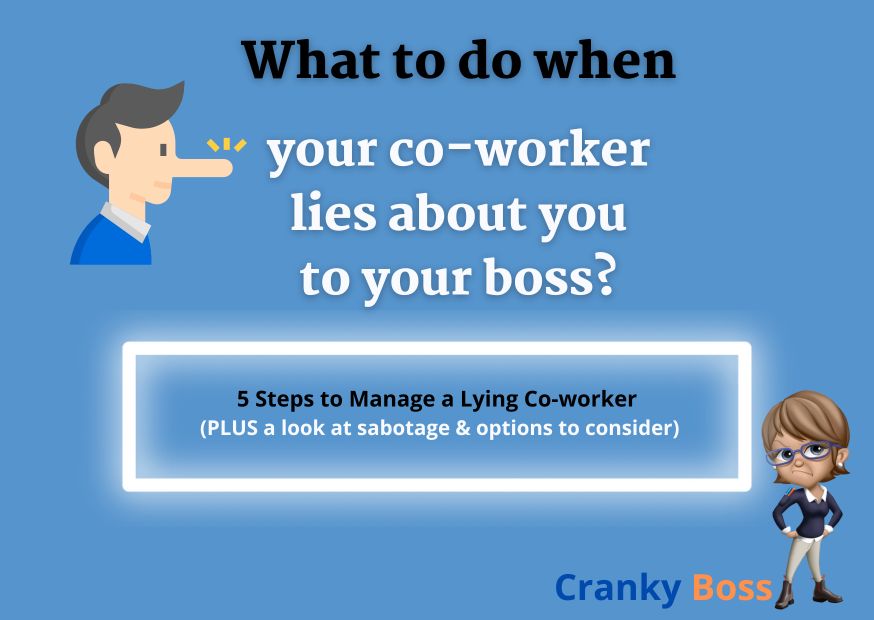Interactions among colleagues can sometimes take an unexpected turn. One of the most challenging situations to navigate is when a co-worker spreads lies or false information about you to your boss. I know as I have experienced this firsthand.
Such actions not only damage your professional reputation but can also create a toxic work environment. Here are some effective strategies on how to address and resolve these issues professionally.
What to do when a co-worker lies to your boss about you?
When faced with the situation where a co-worker has lied to your boss about you, it’s crucial to approach the matter with tact and diplomacy. Your communication style and modifiers are important here. These are some steps you can take:
- Stay Calm and Gather Information: Before reacting, take a moment to collect your thoughts and gather evidence that disproves the false accusations. This could include emails, documents, or witnesses who can corroborate your version of events.
- Schedule a Private Meeting: Request a private meeting with your boss to discuss the issue calmly and professionally. Avoid cursing in the workplace, confrontational language or blaming your co-worker outright. Instead, focus on presenting the facts and clarifying any misunderstandings.
- Address the Concerns Directly: During the meeting, address the specific lies or accusations made by your co-worker. Provide concrete evidence or examples that refute these claims. Emphasize your commitment to honesty and integrity in the workplace. Prepare to shut down any gaslighting.
- Seek Mediation if Necessary: If the situation escalates or if there is a persistent pattern of false accusations, consider involving HR or a neutral mediator to facilitate a constructive dialogue between you, your co-worker, and your boss.
- Focus on Moving Forward: After addressing the immediate issue, focus on rebuilding trust and maintaining a professional relationship with your boss and co-workers. Demonstrate your reliability and competence through your work performance.
What to do when a co-worker spreads lies about you?

Dealing with a co-worker who spreads lies or engage in malicious gossip about you in your workplace requires a strategic approach to protect your reputation and resolve conflicts. Don’t ignore it and dont start finding excuses to get out of work. Here are some steps to consider:
- Gather Evidence: Collect evidence that disproves the false accusations, such as emails, messages, or witness accounts. Documentation is crucial in addressing the issue effectively.
- Confront the Co-worker Privately: Approach the co-worker in a private setting and express your concerns about the false information being spread. Remain calm and avoid escalating the situation further. Being assertive and not aggressive is key here.
- Clarify Misunderstandings: Take the opportunity to clarify any misunderstandings or miscommunications that may have led to the spreading of lies. Provide factual information to counteract the false narrative.
- Document Incidents: Keep a record of any instances where the co-worker spreads lies about you, including dates, witnesses, and the nature of the false accusations. This documentation may be valuable if the issue needs to be escalated.
- Involve HR if Necessary: If the co-worker’s behaviour persists despite your attempts to resolve the issue privately, consider involving HR or a supervisor to intervene and address the situation impartially.
- Focus on Professionalism: Maintain your professionalism and focus on your work performance. Let your actions speak for themselves and demonstrate your integrity to colleagues and superiors.
What to do when your co-worker is sabotaging you and your boss believes them?
What is sabotage in the workplace?
Sabotage in the workplace refers to intentional actions taken by an employee or group of employees to undermine or disrupt the productivity, success, or reputation of an individual, team, department, or the organization as a whole.
These actions can take various forms and may include backbiting and spreading false information, withholding critical resources or information, damaging company property, undermining colleagues’ efforts, manipulating data or processes, or engaging in deceptive practices.
Another form of sabotage is weaponized incompetence, where an employee deliberately pretends to be incapable of completing tasks to shift the burden onto others. By feigning ignorance or inefficiency, they avoid responsibility, making it harder for others to succeed and causing disruptions in the workflow.
Sabotage and coworkers who snitch for personal gain, can significantly impact morale, teamwork, and overall organizational performance if not addressed promptly and effectively.
Dealing with a situation where a co-worker is sabotaging you, and your boss believes their false accusations, requires a strategic approach to address the underlying issues. Here are some options to consider:
- Document Instances of Sabotage: Keep a detailed record of any instances where your co-worker has sabotaged you, such as withholding information, spreading false rumours, or undermining your work.
- Address the Issue with Your Boss: Schedule a meeting with your boss to discuss the situation calmly and present your evidence of sabotage. Be prepared to provide concrete examples and explain the impact on your work and the team.
- Seek Support from HR: If your boss continues to believe the co-worker despite your evidence, consider involving HR to intervene and investigate the situation impartially. HR can provide guidance and support in resolving workplace conflicts.
- Focus on Productivity: Despite the challenges, remain focused on your work and productivity. Demonstrate your professionalism and dedication, which can help mitigate the impact of false accusations and sabotage.
What to do if an employee is lying about you?
Here’s a personal example:
In my late 20s, while working for a corporation, I encountered a co-worker who displayed hostility towards me from the moment I joined the team. It was clear that she was apprehensive about the possibility of me eventually advancing in the company and possibly taking her position. A clear sign of jealousy. This, however, was certainly not my intention. The very first thing she did was treat me like a subordinate – a clear sign of her insecurities. The second thing she did was to patronize me – I remember her throwing around statements like “I worry that you may have not understood the project, as it’s quite complex”. 🙄🙄. She was the type of employee who felt she had to engage in task masking (appear to be busy all the time) because her quality of work was not up to scratch. Her own insecurities drove this appaling behaviour.
Sabotage and Lies
Her actions quickly turned into sabotage, including spreading lies about me to both my immediate supervisor and the head of the department. At other times she would put blame on me for her own shortcomings – i became her scapegoat. This situation was incredibly distressing, considering I was the new addition to the team and felt that her seniority might lead them to believe her over me.
Private Chat
Despite the challenges, I took a strategic approach to address the issue. I first attempted to resolve it informally by arranging a private chat with her, emphasizing my integrity and commitment to professionalism. This approach failed, and she even started to ignore me even after greeting her every morning.
This is when the the gaslighting also began. I escalated the matter by meeting with my immediate supervisor and then the head of the department.
Professionalism
Throughout these discussions, I remained composed, polite, and focused on presenting facts without emotion. It was during these meetings that my co-worker resorted to emotional blackmail, threatening to resign if I continued working with her. Yes, she was the type of coworker that would yell at people in front of others. However, her unprofessional behaviour led to her dismissal within minutes of her outburst.
Apology
Despite the resolution, I extended an apology to the head of the department for the situation’s escalation and assured her of my dedication to contributing positively to the team. Her response was reassuring, as she acknowledged the misconduct and overstepping boundaries of her former assistant and apologized for the distress caused to me.
In her final remarks, she made it clear that such behaviour, including attempts at blackmail, would not be tolerated in the workplace. She was a leader not a boss, and i suddenly understood the difference. I continued my tenure with the company for the next six years without further incidents, welcomed by the department head who valued professionalism and integrity above all else.
A Learning Experience
This experience was incredibly enlightening for me, providing me with a wealth of tools and insights to navigate similar situations in the future.
Fast forward a few years, and I found myself in a different role, now leading a successful business. However, I encountered a familiar challenge as I had to address employees who were spreading false information about each other. I was able to navigate through this successfully with the experience I had behind me.
Summing Up
Navigating workplace conflicts caused by backstabbing or false accusations, undermining and sabotage requires a combination of communication skills, evidence-based approach, and professionalism.
Office politics is one of the ugly sides a workplace has. If you are a victim of this behaviour it can sometimes feel like borderline bullying. According to Maslow’s hierarchy of needs, safety is one of the first boxes we need to tick—because if people don’t feel secure, they won’t be able to focus on anything else, let alone thrive at work.
Tony Robbins’ six human needs—certainty, variety, significance, connection and love, growth, and contribution—further explain why these situations are so harmful. When safety and certainty are threatened, and when significance and connection are missing, it becomes nearly impossible to stay motivated or mentally engaged.
By addressing issues directly, seeking support when needed, and focusing on maintaining a positive work environment, you can effectively manage these challenging situations and protect your professional reputation.
Good Luck!

